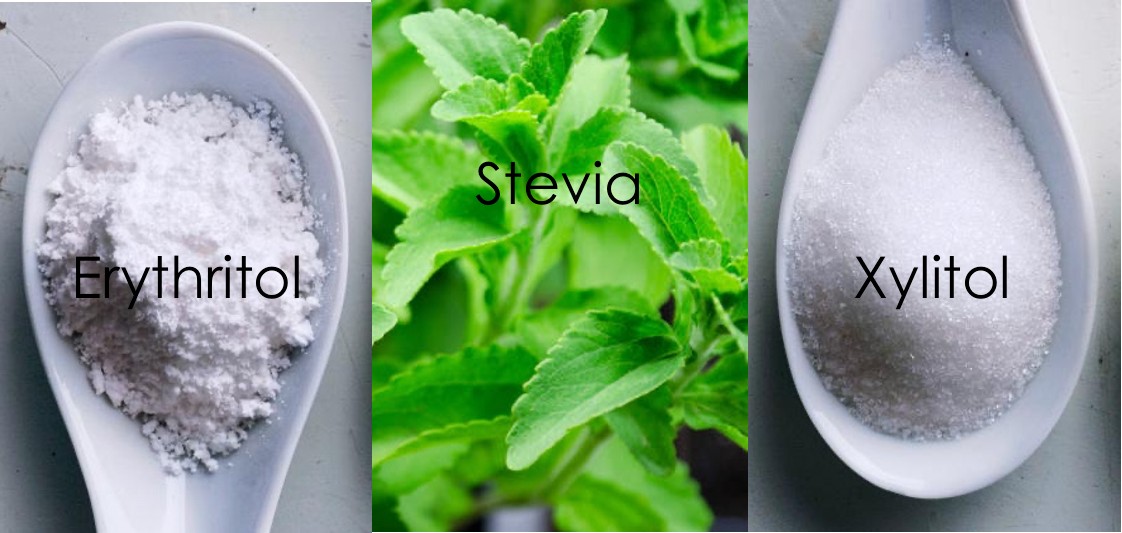Today’s post is about some other sweeteners – Stevia, Erythritol and Xylitol. Are they healthier?
My last post was about the better-known artificial sweeteners like aspartame and sucralose. So today I decided to explore the other popular sweeteners that are available. I was interested to find out if they were a better option or not.
So, after a bit of research, this is what I have found.
First, let’s look at Stevia
Stevia is sweetener derived from the leaves of a plant. The stevia plant is part of the Asteraceae family, related to the daisy and ragweed. The particular species Stevia rebaudiana, is a plant native to Paraguay and Brazil. In those countries the people have used leaves from the stevia bush to sweeten food for hundreds of years.
The active compounds are steviol glycosides, which are considered to be 250 to 300 times sweeter than sugar or sucrose. These compounds also have the added advantage on containing zero calories, which makes it very popular in the weight loss and diet industry.
Is Stevia a healthier option?
The properties of Stevia have been studied for over 100 years. Both earlier and current studies not only confirm the safety of Stevia leaf preparations but also find more and more benefits of its consumption for human health.
These studies have shown that not only is stevia safe for people with diabetes, high blood pressure, and obesity but also can be used for the treatment of these diseases or prevention of their complications.
In addition to its sweet compounds, Stevia leaves contain many other biologically active substances, which have beneficial effects for human health. It has been discovered that stevia has anti-diabetic, anti-hypertensive, anti-tumour, anti-cariogenic, anti-inflammatory and bacteria killing properties. There is also data on the protective effects of Stevia on the digestive system and skin disorders as well as on common complications associated with metabolic syndrome
Next, a look at Erythritol
Erythritol is a common artificial sweetener. Erythritol belongs to the family of sugar alcohols also known as polyols. Polyols are naturally abundant in fruits and vegetables, like grapes and mushrooms as well as in fermented foods like soy sauce. It is also made inside our cells as part of normal metabolism. But when used as a sweetener, erythritol levels are typically more than 1,000-fold greater than levels found naturally in foods.
It is the only polyol that is non-caloric, providing no energy to the body. The majority of erythritol cannot be metabolised by the body and is excreted unmodified into the urine without changing blood glucose and insulin levels.
Erythritol as sugar replacement can be found as tabletop sweetener, in beverages, chewing gum, chocolate, lollies, and in bakery products. Due to its mild sweetness, it allows a volume-for-volume replacement of sugar.
Any health benefits?
Studies have found that there are some benefits to consuming erythritol. These include being a free radical scavenger with the ability to conduct anti-oxidant activity while circulating the body before it is excreted. So far, the only known side effect relating to Erythritol is possible flatulence and a laxative effect when consumed in excess.
And finally, Xylitol
Xylitol is a sugar alcohol that is commonly used as a sweetener. Xylitol occurs naturally in small amounts in plums, strawberries, cauliflower, and pumpkin; humans and many other animals make trace amounts during metabolism of carbohydrates. It can also be artificially produced, mainly from plant materials chemically or by fermentation.
The white crystal-like granules of Xylitol have a taste and aroma similar to white sugar as well as the same sweetness. However, the body absorbs xylitol more slowly than sugar/sucrose, and xylitol supplies 40% fewer calories than an equal mass of sucrose.
Xylitol is stable enough to be used in place of sugar in baking, but because xylitol and other polyols are more heat-stable, they do not caramelise as sugars do.
Any health benefits?
Xylitol also has some health benefits. It has been found to increases saliva production, which helps in treating dry mouth or xerostomia. It improves breath odour and reduces infections in the mouth. The consumption of xylitol also assists is the absorption of calcium and B vitamins and helps to maintain healthy gut function.
With regards to known side effects relating to xylitol, these include possible intestinal discomfort and a laxative effect when consumed in excess.
If you are trying to limit your sugar or sucrose intake, there are many options available to you. The 3 sweeteners mentioned in this post, can be used together or individually. They are also all easily accessible and can be purchased from the supermarket.
Hopefully this post and the last will assist you in finding the right choice in sweetener for you. If you have any doubts, always seek assistance from your chosen health professional.
We hope you have found this information interesting.
Till the next post,
Live clean n Prosper.
Sources – National Library of Medicine, Pub Med Central – LiveScience – Wikipedia –

